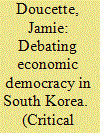| Srl | Item |
| 1 |
ID:
117050


|
|
|
|
|
| Publication |
2012.
|
| Summary/Abstract |
The existence of cooperative labor relations within leading firms in South Korea (hereafter Korea), amid unfavorable national-level economic and political institutions, merits study by comparative political economists. Late industrializing Korea lacks the conditions that sustain cooperative labor relations in other nonliberal capitalist countries like Germany and Japan. More relevant, therefore, are debates over the emergence and practice of "high performance work systems" (HPWS) in the unfavorable environments of advanced liberal and developing country capitalism. As a successful late industrializing country that combines both advanced and developing capitalism characteristics, Korea represents a useful testing ground for ideas about HPWS. This article will examine cooperation in four leading Korean firms and use the findings to advance key HPWS debates about the possibilities of participation and the conditions under which cooperation can emerge and be sustained.
|
|
|
|
|
|
|
|
|
|
|
|
|
|
|
|
| 2 |
ID:
140251


|
|
|
|
|
| Summary/Abstract |
In the 2012 Korean presidential election, both liberal and conservative parties fought their campaigns on the slogan of “economic democratization,” marking a strong departure from past presidential elections and the growth-first policies of the then-incumbent conservative administration. Both parties pledged to tackle growing social polarization and the concentration of economic power by reforming the corporate governance of Korea's large, family-led conglomerates (chaebol), to the degree that chaebol reform itself became synonymous with economic democratization. This focus led to a series of heated exchanges among liberal-left reformers about the vision of economic democratization being promoted, with one camp favoring the creation of a “fair market” through the restructuring of the chaebol and another promoting the protection of the chaebol’s management rights over their affiliates as a desirable strategy for the creation of a Korean welfare state. This essay examines the long-standing tensions between these two liberal-left perspectives and argues that the capital-centric and market-based visions these camps promoted risk confining intellectual debate over the meaning of economic democracy within boundaries that serve dominant political interests.
|
|
|
|
|
|
|
|
|
|
|
|
|
|
|
|
| 3 |
ID:
174562


|
|
|
|
|
| Summary/Abstract |
In recent years, non-traditional or ‘emerging’ donors such as South Korea have organised their development cooperation models in a manner that seeks to complement the capacities of the private sector by extending the overseas activities of domestic businesses. To better understand this process, this article examines the role of South Korea’s large, family-led conglomerates (chaebol) in its growing international development sector. In particular, we focus on how the concept of corporate social responsibility (CSR) has been used to link the role of its large, and frequently scandal-ridden, private companies to international development, and, by extension, how it has helped to internationalise state–business networks long associated with the Korean developmental state. We examine two strategies through which this has been carried out. The first is by extending the logic of creating shared value (CSV, a derivative of CSR) to aid and infrastructure projects in which chaebol and other state-linked businesses have participated. The second is by directly embedding CSR-based aid initiatives in the value chains of the specific chaebol themselves.
|
|
|
|
|
|
|
|
|
|
|
|
|
|
|
|
| 4 |
ID:
097225


|
|
|
| 5 |
ID:
161559


|
|
|
|
|
| Summary/Abstract |
Existing theories on real exchange rates predict a significant undervaluation of the Korean won (KRW) in the early and mid-1990s. The paper demonstrates why this expectation did not materialize and instead an unprecedentedly large degree of overvaluation took place. Focusing on three variables, namely, financial repression, devaluation pass-through, and policy exhibitionism, the paper examines how the unraveling of the developmental state eventually gave rise to the 1990s’ overvaluation. It argues that the policy exhibitionism of the new civilian government amplified the influence of Chaebol on monetary policies, which in turn created a strong appreciative force to KRW. It also contends that the increasing exchange rate pass-through onto the prices of imported intermediate goods explains why Chaebol did not desire to tame the excessive appreciative trend despite its detrimental effect on their exports. The paper offers policy implications for other state-led, emerging economies.
|
|
|
|
|
|
|
|
|
|
|
|
|
|
|
|